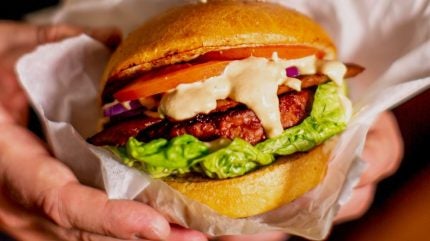
Swiss food group Orior suggests there is still some growth to target in the plant-based category despite “poor” first-half sales outside of its home market.
CEO Daniel Lutz emphasised Orior’s commitment to the plant-based segment as he talked through the results today (23 August), which showed group sales rose 0.9% on a reported basis and 2.4% organically to SFr312.1m ($354.9m).

Discover B2B Marketing That Performs
Combine business intelligence and editorial excellence to reach engaged professionals across 36 leading media platforms.
However, in the convenience business division housing Orior’s Happy Vegi Butcher alternative-meat brand, reported sales dipped 0.1% to SFr109.8m. Turnover in the plant-based segment “was not satisfactory, mainly due to poor sales in the UK”, the company said. Happy Vegi Butcher features steak, mince, burgers, meatballs, kebabs and nuggets.
In a follow-up presentation, Lutz said plant-based sales in the UK were “inadequate, with only minimal signs of recovery”, while sales in Switzerland remained “stable”.
He added with respect to plant-based: “We remain fully convinced of the future viability and growth potential and see the current development as a temporary bear market. The main reason for my statement lies in the fact that more and more people are committed to the flexitarian diet.”
Lutz’s comments echoed those of Dutch dairy giant FrieslandCampina, which is poised to rollout a chicken alternative in the UK – Tender’lish.

US Tariffs are shifting - will you react or anticipate?
Don’t let policy changes catch you off guard. Stay proactive with real-time data and expert analysis.
By GlobalDataSpeaking to Just Food on the planned launch, Alison Lees, the UK marketing chief for the Tender’lish brand, said of the category: “It’s having a few challenges but there are still millions of people buying into meat-free and it’s still up versus say five years ago. The market has grown consistently double-digits. It’s not a surprise that there has been a slowdown but there’s still plenty of growth to go for.”
Orior’s approach in the category is a “rigorous focus on building and developing new export sales markets”, Lutz said today, along with continued innovation and the “optimisation of cost structures and efficiency in production” to boost competitiveness.
The company outlined the second-half challenges for the convenience business, which also houses the Pastinella pasta brand, as characterised by a “high rate of inflation” aligned with a “loss of purchasing power in plant-based target markets outside Switzerland”.
Like other packaged food manufacturers in the current climate, Orior has raised prices to counter higher input costs but did not reveal any numbers today nor quantify any impact on volumes. The business operates across the retail, foodservice and travel channels, with a range that also includes ready meals, premium meats, pâtés, organic vegetables and fruit juices.
“Last year, we saw more volume growth than price growth. This year, the reverse is true. Most of the sales growth comes from price increases,” CFO Andreas Lindner said.
Lutz added: “We acknowledge the ongoing geopolitical challenges with great respect and we are addressing them consistently and proactively. In the area of input costs, we try to proactively manage or minimise potential price increases along the entire value chain.”
Challenges across the group for the rest of the year remain lingering inflation, “volatile” input costs and “price sensitivity for premium products”, Orior said.
However, Lutz said energy costs into 2024 have already been locked in, while Orior purchased more pork products at “lower prices” to head off a price increase in Switzerland.
Elsewhere in the first-half numbers, the group gross margin increased 314 basis points to 48.8%. However, the EBITDA margin was flat at 9.8% as the profit value of that metric rose 0.8% to SFr30.5m.
Net profit was also flat at SFr12.9m versus SFr13m a year earlier.





